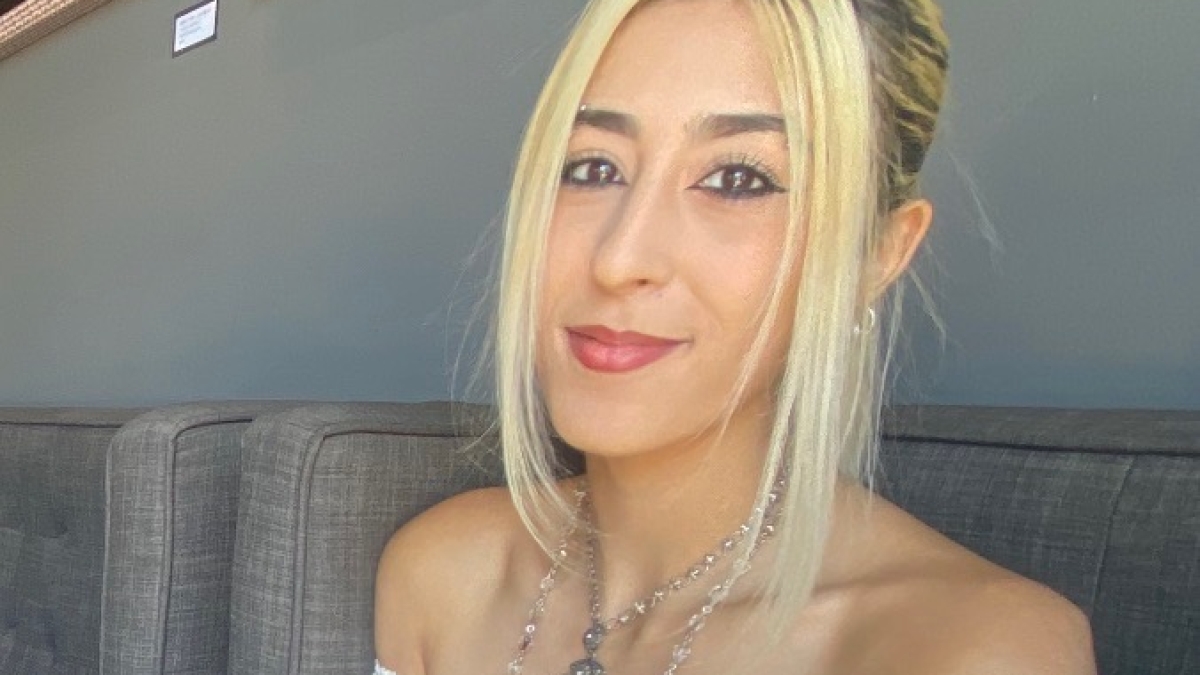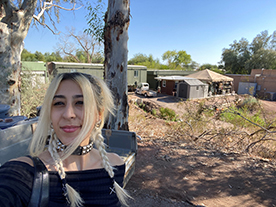From dropping out to graduate degree, first-gen student finds purpose in global health

Malak El-Jada is graduating with a Master's of Science degree in global health. Courtesy photo
Editor's note: This story is part of a series of profiles of notable fall 2023 graduates.
As a first-generation college student, Malak El-Jada said she had to work to overcome imposter syndrome. With the guidance of professors and advisors, El-Jada found her calling in global health and succeeded at Arizona State University.
This semester, the Palestinian-born, Phoenix-raised student will be graduating with a Master’s of Science degree in global health.
“I took the intro to global health course as an undergrad studying biochemistry,” El-Jada said. “It was one of the most exciting classes I had taken because it encouraged students to look at every aspect of health and to connect that with what makes us human: our culture and our communities. I quickly added global health as a minor and eventually just dropped biochem because I knew my heart was in global health.”
El-Jada tells ASU News that during her time at the School of Human Evolution and Social Change, she participated in internships and was awarded the Del Jones Memorial grant from the Society for Applied Anthropology.
“Thank you to the School of Human Evolution and Social Change for being my home; I have never felt more supported and believed in academically than I do here,” El-Jada said.
After graduation, El-Jada’s goal is to work in a community-engaged space either as an advocate or an analyst.
Editor's note: Answers have been edited for length and clarity.
Question: Why did you choose ASU for your degree?
Answer: I chose Arizona State University because of the School of Human Evolution and Social Change (SHESC), quite honestly. SHESC is such an incredible community of academics, both faculty and students, who truly embody ASU’s commitment to inclusion and responsibility to our community.
Q: Did you participate in any internships during your time at ASU?
A: I am an intern with the Central Arizona Shelter Services. I work under PhD student Richard Southee, examining the intersection of intimate partner violence (IPV) and homelessness with a focus on how to improve intake systems to ensure those most in need are appropriately prioritized. IPV and homelessness co-occur at a high rate; women who experience IPV are four times more likelyPavao, 2007 to experience homelessness; with this comes major impacts on mental and physical health.
Q: What’s something you learned while at ASU — in the classroom or otherwise — that surprised you or changed your perspective?
A: During my time at SHESC, I worked in the Culture, Health, and Environment Lab (CHELab). Working in research labs felt like I was pulling back the curtain on the world of science. As a first-generation student, every part of the academic institution was new to me. Getting to see the nitty-gritty of every stage of research from data collection and management to analysis to presenting work at a conference changed how I understand how we collectively build knowledge. It’s so much more communal than the image of the shut-in scientist that I was familiar with.
Q: How was your experience being a first-generation college student?
A: Being a first-gen student, you really feel the imposter syndrome. I didn't understand how to access the resources at the university, or even some of the words being used to describe courses. It felt like I was missing something, and I was, because there is just so much hidden curriculum to the academy that you just wouldn't know about without guidance. Even once you feel like you're starting to understand it, you find out that the regalia for graduation is totally different and you still don't quite understand the difference between commencement and convocation ceremonies. I constantly question how I got this far, if I'm smart enough, or if I just got lucky.
El-Jada touring the Phoenix Zoo Veterinary Hospital to discuss biosecurity measures as part of the One Health course, which focuses on the intersection of human health, animal health and environmental health. Courtesy photo
Q: Which professor or person taught you the most important lesson while at ASU?
A: Carlos Vélez-Ibáñez, Regents Professor and founding director emeritus of the School of Transborder Studies had a huge impact on my academic journey. I wrote a paper on his book “Reflections of a Transborder Anthropologist,” and one of the questions he was adamant about me answering was "Who’s missing?" Whose stories are not being told? How does that impact how we understand our world? That simple question of “who’s missing” is such an important part of critically thinking about the problems we are facing and how we build solutions that truly benefit us all.
Professor Vélez-Ibáñez and academic advisor Elissa Shapiro helped me get back into school after I dropped out. I thought at that point in my life that I would not finish my bachelor's degree, let alone a graduate degree. When I dropped out, it wasn't like I sat down and made the decision to withdraw. I was so overwhelmed that I just didn't show up or turn in any of my finals. I didn't know what a medical or compassionate withdrawal was or how to ask for it.
For nearly three years, I was too embarrassed to tell anyone what happened, let alone ask for help. When COVID hit, I was furloughed. I realized all I was doing was reading and going over the CDC website obsessively, and I just needed to get back into school.
Advisor Elissa Shaprio was compassionate and guided me through the process of submitting appeals and re-enrolling. I was taking a class with Professor Vélez-Ibáñez when I dropped out. Rather than failing me for not turning in the final, he coded the grade as incomplete. I emailed him and asked if there was anything I could do to complete the course. Without hesitation, he expressed concern for me and understood my situation. Not only did he allow me to finish the final paper three years later, but also advocated for my re-enrollment. He believed in my academic ability and helped restore my confidence.
More Health and medicine

College of Health Solutions alumnus named Military Medic of the Year
By Keri Hensley and Kimberly LinnJonathan Lu has looked out for the health of his fellow military service members his whole…

ASU, Mayo Clinic forge new health innovation program
Arizona State University is on a mission to drive innovations that will help people lead healthier lives and empower health care…

Innovative, fast-moving ventures emerge from Mayo Clinic and ASU summer residency program
By Georgann YaraIn a batting cage transformed into a custom pitching lab, tricked out with the latest in sports technology,…
